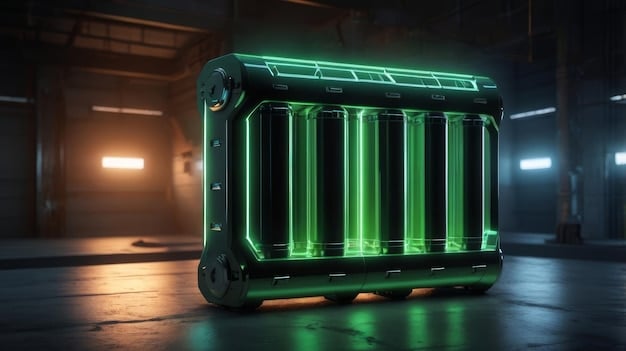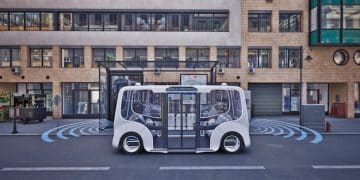Optimizing EV Batteries: The Role of Machine Learning

Machine learning plays a crucial role in optimizing electric vehicle (EV) battery performance by enhancing energy management, predicting battery life, and improving overall efficiency through data-driven insights and adaptive control strategies.
The electric vehicle (EV) industry is rapidly evolving, and at the heart of this transformation lies the battery. But how can we ensure these batteries perform optimally, last longer, and charge faster? The answer lies in the intelligent application of machine learning in optimizing electric vehicle battery performance.
The Evolution of Electric Vehicle Batteries
Electric vehicle batteries have come a long way since the early days of EVs. Initially, limitations in battery technology hindered widespread adoption. However, continuous advancements have led to significant improvements in energy density, lifespan, and charging capabilities.
The evolution can be traced through different battery chemistries, from early nickel-metal hydride (NiMH) to the now dominant lithium-ion (Li-ion) batteries. These advancements are paving the way for machine learning to optimize battery performance further.
Key Milestones in EV Battery Development
The development of EV batteries has seen several pivotal milestones, each contributing to making EVs more viable and efficient.
- Introduction of Lithium-Ion Batteries: Early adoption of Li-ion batteries significantly improved energy density and reduced weight compared to previous technologies.
- Advancements in Battery Management Systems (BMS): Sophisticated BMS enabled better monitoring and control of battery parameters, enhancing safety and performance.
- Fast Charging Technologies: The development of fast charging technologies reduced charging times, addressing a key concern for EV users.
- Increased Energy Density: Continuous research and development have led to higher energy density batteries, increasing the range of EVs.
As technology evolves, machine learning has become a crucial piece in pushing the boundaries of battery performance and durability.
In conclusion, the evolution of electric vehicle batteries has been marked by significant technological advancements, setting the stage for machine learning to play a pivotal role in optimizing their performance.

Understanding Machine Learning in Battery Management
Machine learning offers powerful tools for enhancing battery management systems (BMS). By analyzing vast amounts of data, machine learning algorithms can predict battery behavior, optimize charging and discharging cycles, and extend battery lifespan. Its main purpose is to adapt to different driving conditions and driver behaviors, to maximize the efficiency and longevity of the battery.
This approach signifies a more data-driven and adaptive strategy compared to the traditional rule-based systems.
How Machine Learning Enhances BMS
Machine learning algorithms bring several advantages to BMS, enhancing their ability to manage and optimize battery performance.
- Predictive Analytics: Machine learning models can predict the State of Health (SOH) and State of Charge (SOC) of the battery, improving accuracy over traditional methods.
- Adaptive Charging Strategies: Algorithms can optimize charging rates based on real-time data, reducing degradation and improving charging efficiency.
- Fault Detection and Diagnostics: Machine learning can detect anomalies and potential faults early, preventing damage and ensuring safety.
- Personalized Driving Profiles: By learning driver behavior, the BMS can customize energy management, optimizing battery performance based on individual usage patterns.
Machine learning is changing how batteries are managed, contributing to enhanced performance and longevity.
In short, machine learning significantly enhances battery management by providing predictive analytics, adaptive charging strategies, and advanced fault detection, leading to improved performance and longevity.
Predictive Modeling for Battery Life
Predictive modeling is a critical application of machine learning in optimizing vehicle batteries, and it offers a way to forecast future outcomes based on available data. These models use a range of algorithms to analyze historical and real-time data to estimate battery degradation, remaining useful life (RUL), and overall performance over time. Predictive models not only help in predicting battery life but also in optimizing its usage to extend lifespan and improve reliability.
By understanding these trends, manufacturers and users can make informed decisions about maintenance, replacement, and usage patterns.
Techniques Used in Predictive Modeling
Several machine learning techniques are employed in predictive modeling for battery life, each offering unique advantages.
- Regression Models: Linear and non-linear regression models are used to establish relationships between battery parameters and degradation rates.
- Neural Networks: Deep learning models like recurrent neural networks (RNNs) and long short-term memory (LSTM) networks can capture complex dependencies and temporal patterns in battery data.
- Support Vector Machines (SVM): SVM can be used for classification and regression tasks, predicting battery health status and estimating RUL.
- Ensemble Methods: Techniques like random forests and gradient boosting combine multiple models to improve prediction accuracy and robustness.
The benefits of using this include enhanced reliability, prolonged lifespan, and optimized battery usage.
In conclusion, predictive modeling provides valuable insights into battery degradation and remaining useful life, enabling better decision-making and optimized usage patterns.

Enhancing Energy Management Through AI
Artificial intelligence (AI) plays a pivotal role in optimizing energy management in electric vehicles. AI algorithms analyze real-time data from various sources, including battery sensors, GPS, and weather forecasts, to optimize energy consumption. This leads to improved energy efficiency, extended driving range, and reduced overall energy waste.
By anticipating energy needs and dynamically adjusting system parameters, AI helps maximize the utilization of available energy.
Benefits of AI in Energy Management
AI enhances energy management in EVs through several key benefits.
- Real-Time Optimization: AI algorithms continuously monitor and adjust energy consumption based on real-time conditions, ensuring optimal usage.
- Predictive Energy Consumption: By analyzing historical data, AI can predict future energy needs and proactively adjust settings to conserve energy.
- Adaptive Climate Control: AI can optimize HVAC systems based on passenger preferences and environmental conditions, minimizing energy waste.
- Route Optimization: AI-powered navigation systems can suggest energy-efficient routes, considering factors like traffic, terrain, and charging station availability.
AI helps maximize battery performance and energy efficiency.
In short, AI significantly enhances energy management by providing real-time optimization, predictive energy consumption, and adaptive climate control, leading to improved efficiency and extended driving range for EVs.
Challenges and Future Directions
Despite the numerous benefits, implementing machine learning in EV battery optimization faces several challenges. One of the main obstacles is the need for large, high-quality datasets to train the models effectively. Data acquisition, storage, and processing can be resource-intensive. There are also concerns with data privacy and security, as battery data may contain sensitive information about driving habits.
Future research and development efforts are needed to address these issues and unlock the full potential of machine learning in EV battery technology.
Addressing Current Challenges
Overcoming the challenges in implementing machine learning for EV battery optimization requires concerted efforts.
- Data Availability and Quality: Investing in data collection infrastructure and developing methods for data augmentation and synthesis.
- Computational Resources: Utilizing cloud computing and edge computing to handle large datasets and perform real-time analysis.
- Data Privacy and Security: Implementing robust data encryption and anonymization techniques to protect user privacy.
By addressing these challenges and embracing future directions, it is possible to fully realize the potential of machine learning to transform the EV industry.
In conclusion, while challenges exist, ongoing research and development efforts are paving the way for wider adoption and greater impact of machine learning in EV battery technology.
Case Studies: Successful Implementations
Several companies have successfully implemented machine learning in EV battery optimization, achieving substantial improvements in performance and efficiency. Tesla uses machine learning algorithms to optimize battery charging, predict vehicle range, and manage battery health. These initiatives have resulted in longer battery lifespans, reduced charging times, and improved overall vehicle performance.
Real-world applications demonstrate the practical benefits and effectiveness of machine learning in enhancing EV battery technology.
Examples of Successful Implementations
A number of case studies highlight the successful application of machine learning in optimizing EV battery performance.
- Tesla: Uses machine learning for adaptive battery charging and predictive maintenance, improving battery longevity and vehicle reliability.
- BMW: Employs AI to optimize energy consumption and manage thermal behavior of batteries, enhancing driving range and performance.
- Nissan: Utilizes machine learning for battery diagnostics and fault detection, reducing downtime and improving safety.
These case studies highlight the practical benefits of using ML in EVs.
In short, case studies of Tesla, BMW, and Nissan demonstrate how machine learning can drive significant improvements in battery performance, longevity, and safety in electric vehicles.
| Key Point | Brief Description |
|---|---|
| 💡 Machine Learning in BMS | Enhances battery management systems through real-time data analysis and optimization. |
| 🔋 Predictive Modeling | Forecasts battery degradation and lifespan using various ML techniques. |
| ⚡ AI for Energy Management | Optimizes energy consumption through real-time data analysis and adaptive climate control. |
| 🚗 Case Studies | Tesla, BMW, and Nissan showcase successful ML implementations in EV batteries. |
Frequently Asked Questions
▼
Machine learning enhances energy management, predicts battery life, optimizes charging cycles, and improves overall battery performance through data-driven insights and adaptive control strategies.
▼
By analyzing vast amounts of data, machine learning algorithms can accurately predict battery behavior, optimize charging and discharging cycles, and extend battery lifespan, leading to improved efficiency.
▼
Common techniques include regression models, neural networks, support vector machines, and ensemble methods, each tailored to capture different aspects of battery degradation and performance.
▼
AI algorithms analyze real-time data to optimize energy consumption, predict energy needs, and adapt climate control systems, resulting in improved energy efficiency and an increased driving range.
▼
Challenges include the need for large, high-quality datasets, concerns about data privacy and security, and the resource-intensive nature of data acquisition, storage, and processing.
Conclusion
In conclusion, machine learning is revolutionizing the performance and management of electric vehicle batteries. By optimizing energy consumption, predicting battery life, and enhancing energy management, AI and machine learning are paving the way for more efficient, reliable, and sustainable electric vehicles.





